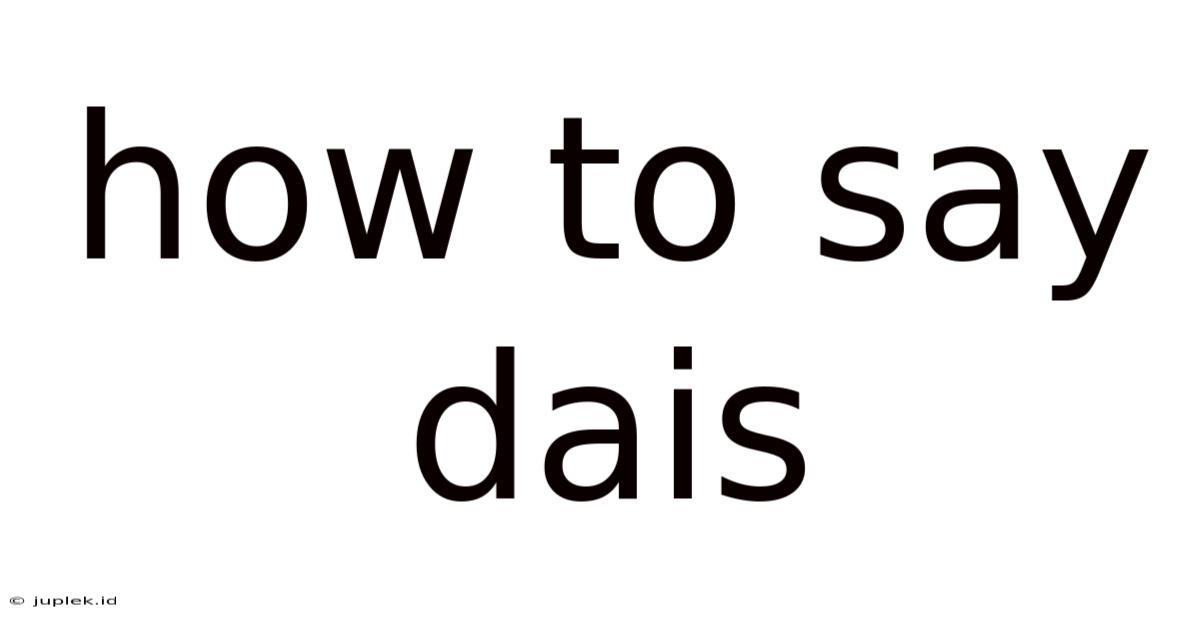How To Say Dais

Discover more detailed and exciting information on our website. Click the link below to start your adventure: Visit Best Website meltwatermedia.ca. Don't miss out!
Table of Contents
How to Say "Dais": A Comprehensive Guide to Pronunciation, Usage, and Cultural Nuances
The word "dais" often evokes images of formal settings, elevated platforms, and important figures. But understanding how to correctly pronounce and utilize this word requires delving beyond its simple definition. This comprehensive guide explores the pronunciation, etymology, usage, and cultural nuances associated with the word "dais," providing a thorough understanding for anyone seeking to confidently incorporate it into their vocabulary.
Pronunciation: A Matter of Emphasis
The pronunciation of "dais" is deceptively simple, yet variations exist depending on regional accents and individual speech patterns. The most common and accepted pronunciation is:
/deɪs/ (rhymes with "days")
The emphasis should always fall on the first syllable. Avoiding the incorrect pronunciation of /daɪs/ (rhyming with "dice") is crucial for maintaining clarity and projecting a knowledgeable tone. Consistent practice with the correct pronunciation, perhaps by recording yourself and listening back, will solidify its place in your vocabulary.
Etymology: Tracing the Word's Origins
Understanding the etymology of "dais" sheds light on its meaning and usage. The word originates from the Old French word "dais," which itself derives from the ancient Greek word "daseios," meaning "dazzling" or "shining." This etymology hints at the historical association of a dais with a raised, often richly decorated platform, designed to draw attention to those situated upon it. Over time, the meaning shifted to specifically refer to the raised platform itself, rather than its inherent visual brilliance.
Usage: Contextual Considerations
The word "dais" is not used casually. Its formal tone limits its application to specific contexts. Here's a breakdown of appropriate usage:
-
Formal Events and Ceremonies: Daises are commonly found at graduations, weddings, awards ceremonies, and other formal gatherings. The raised platform provides a visually prominent location for speakers, honorees, or important guests.
-
Governmental and Institutional Settings: Council chambers, courtrooms, and university halls often feature daises for officials, judges, or professors. The elevated position reinforces their authority and importance.
-
Religious Settings: While less common than in secular settings, daises can appear in some religious structures, typically serving a similar purpose of elevating important figures during ceremonies or services.
-
Literary and Figurative Usage: The word "dais" can be used figuratively to represent a position of power, prestige, or prominence. For instance, one might describe a successful entrepreneur as having "risen to the dais of business leadership."
-
Incorrect Usage: Avoid using "dais" to refer to any elevated platform. A simple stage or podium is not a dais. The word implies a degree of formality and historical context that distinguishes it from more general terms.
Cultural Nuances: A Global Perspective
While the English word "dais" has a relatively straightforward meaning, its usage and cultural significance can vary across different contexts.
-
Historical Significance: The historical association of daises with royalty and power adds a layer of cultural weight. Understanding this historical context enriches the word's meaning and allows for more nuanced use.
-
Architectural Styles: The architectural style of a building featuring a dais often reflects its purpose and historical significance. A simple modern dais will differ significantly from an ornately carved dais in a historic building.
-
Regional Variations: While the core meaning of "dais" remains consistent, subtle variations in usage might exist across different English-speaking regions.
Differentiating "Dais" from Similar Terms:
It's crucial to distinguish "dais" from similar terms that often cause confusion:
-
Podium: A podium is a raised platform typically used for a single speaker, often with a lectern. It is less formal than a dais.
-
Stage: A stage is a larger platform used for performances, presentations, or other events. It lacks the formal connotations associated with a dais.
-
Platform: This is a general term for a raised surface and can refer to anything from a simple step to a large stage. It lacks the specific formality and historical context of a dais.
Examples of "Dais" in Context:
- "The graduation ceremony took place on a beautifully decorated dais."
- "The mayor addressed the city council from the elevated dais."
- "She had finally reached the dais of her profession, achieving unparalleled success."
- "The ancient courtroom featured a magnificent dais where the judge presided."
Conclusion: Mastering the Art of "Dais"
The word "dais," though seemingly simple, possesses a rich history and nuanced usage. By understanding its pronunciation, etymology, appropriate contexts, and cultural significance, one can confidently and effectively incorporate it into their vocabulary, projecting knowledge and sophistication. Remember the correct pronunciation, avoid casual use, and appreciate its historical weight to fully grasp the power of this often-misunderstood word. Consistent practice and mindful application will solidify your understanding and enable you to use "dais" with precision and grace. The next time you encounter a formal setting or need to describe a position of elevated authority, you will be equipped to use "dais" correctly, adding depth and elegance to your communication.

Thank you for visiting our website wich cover about How To Say Dais. We hope the information provided has been useful to you. Feel free to contact us if you have any questions or need further assistance. See you next time and dont miss to bookmark.
Also read the following articles
| Article Title | Date |
|---|---|
| How To Say Once | Apr 08, 2025 |
| How To Say Limoges | Apr 08, 2025 |
| How To Say Cultivated In A Sentence | Apr 08, 2025 |
| How To Say Most | Apr 08, 2025 |
| How To Say Happy Name Day In Greek | Apr 08, 2025 |
